
8 Essential Steps to Empower You in Ethical AI Marketing
Every headline screams about AI, but few talk about trust. I feel that gap each time a client asks if machines will replace judgment. Your audience feels it too, so ethical AI marketing becomes your competitive edge.
I built my career on ethical AI marketing principles, because shortcuts damage trust faster than any algorithm. When integrity guides algorithms, campaigns convert and reputations grow stronger.
This article gives you eight steps that turn ethics into action. Together, we will discuss the ethical considerations for using AI in marketing in plain language. You will master AI ethics in digital marketing and apply them before your next brief. We will explore AI marketing ethics and keep every sentence practical.
Expect clear tips on AI ethics in marketing that protect data and delight customers. We will expose the hidden ethics of AI in marketing and show how to lead with courage. By the end, you will answer stakeholders confidently and act with integrity, not guesswork. Let’s begin.
Establish Your Ethical AI Marketing Framework
Strong governance transforms values into daily habits, and 63% of telecom firms already operate AI ethics committees for oversight.
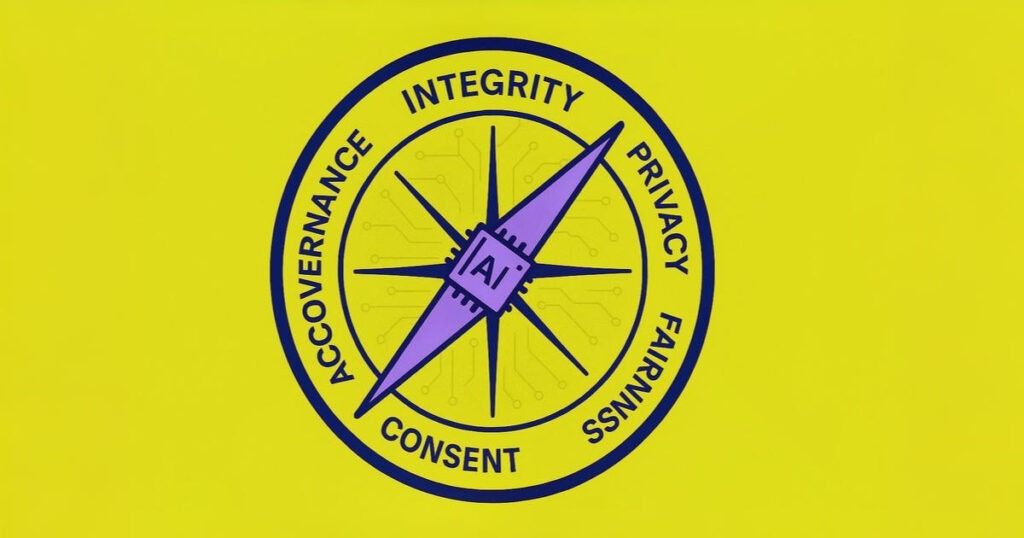
Define Core Principles
Start with values, not code. Map your brand principles to ethical AI marketing commitments that everyone can repeat. Ask yourself again, what are the ethical considerations for using AI in marketing before a single model trains?
Ground decisions in transparency and empathy to embed AI ethics in digital marketing from day one. This stance keeps AI marketing ethics visible when speed pressures mount.
It also anchors AI ethics in marketing within your culture, not just policy binders. By naming the ethics of AI in marketing upfront, you stop vague debates and gain shared language.
Build Governance Structures
Turn principles into routines. Form a cross‑functional council that reviews every automated touchpoint against ethical AI marketing benchmarks. Document roles, so no gap exists.
More than 67% of executives now draft specific AI expectations for staff. Yet 72% of organizations still lack formal AI ethics guidelines, leaving dangerous gaps.
Include rotating customer advocates to spotlight ethical concerns about AI in early marketing. Record decisions and publish them internally. This habit proves accountability and inspires the next initiative.
Prioritize Data Privacy And Consent
Personalization relies on trust, and 2024 research underscores explicit consent as the heart of ethical AI marketing excellence.
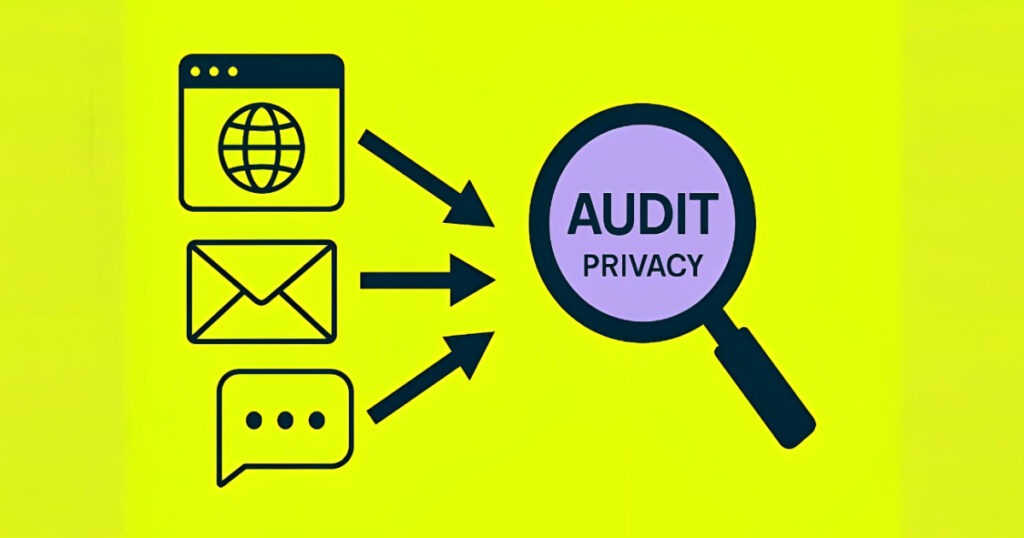
Audit Your Data Practices
Transparency begins with visibility. Create a living map of every field you collect and every system that stores it. This map shows you ethical AI marketing hotspots where sensitive details hide.
Ask your team about the ethical considerations for using AI in marketing when that data fuels look‑alike audiences. Flag each risk using AI ethics in digital marketing checklists. Keep AI marketing ethics dashboards visible so blind spots shrink. Make AI ethics in marketing a measurable metric, not a vague hope.
Obtain And Document Consent
Explicit consent fuels trust. 75% of global knowledge workers already use generative AI at work. Meanwhile, 99% of senior leaders are familiar with generative AI tools.
That scale magnifies the ethics of AI in marketing when data enters black boxes. So, present plain‑language opt‑ins across email, web, and chat. Review AI ethical considerations and social media marketing rules for social feeds before launching a predictive ad.
Archive consent logs with timestamps. These records satisfy regulators and reassure customers that ethical considerations and AI transparency are more than slogans.
Ensure Algorithmic Fairness And Mitigate Bias
Bias lurks in datasets, but new fairness frameworks show proactive audits avert discriminatory outcomes before they sabotage engagement.
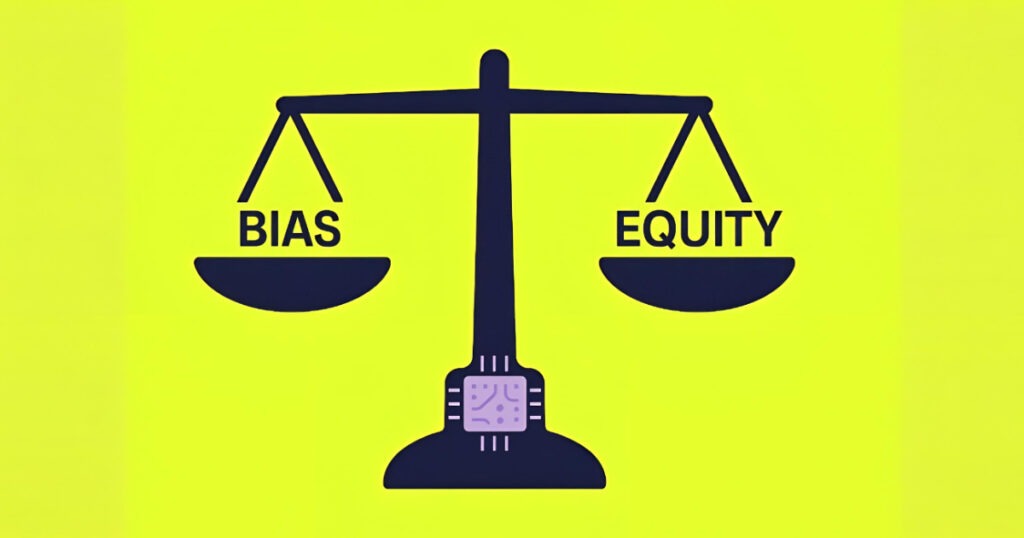
Conduct Bias Assessments
A systematic review of 445 studies ranked bias as the most researched AI marketing issue. Bias hides in data, code, and culture. Run baseline tests before models go live in any ethical AI marketing scenario.
Design checklists highlighting the ethical considerations for using AI in marketing around protected attributes. Set thresholds using AI ethics in digital marketing benchmarks. Document outcomes so that AI marketing ethics progress is visible to auditors.
Keep AI ethics in marketing reviews, repeating it after each dataset refresh. Invite external experts to challenge the ethics of AI in marketing you deploy.
Implement Ongoing Monitoring
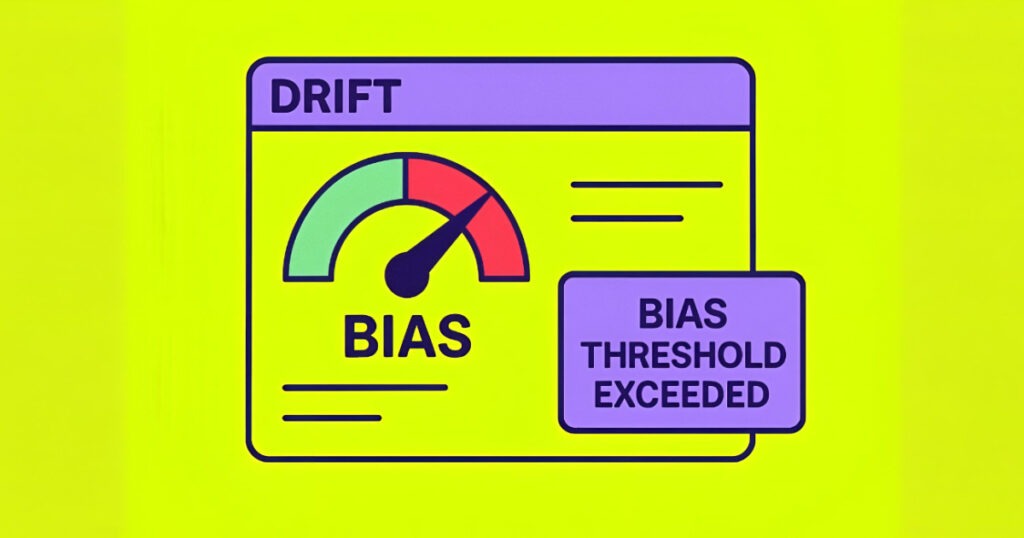
Bias never sleeps, so monitoring cannot pause. Integrate alerting into pipelines. Trigger reviews when drift exceeds limits.
Address emerging ethical concerns of AI in marketing in weekly stand‑ups. Log every decision, celebrating quick fixes and hard lessons alike.
Maintain Human Oversight And Accountability
Including human reviewers at critical stages aligns AI actions with brand values and regulatory expectations, preserving accountability.
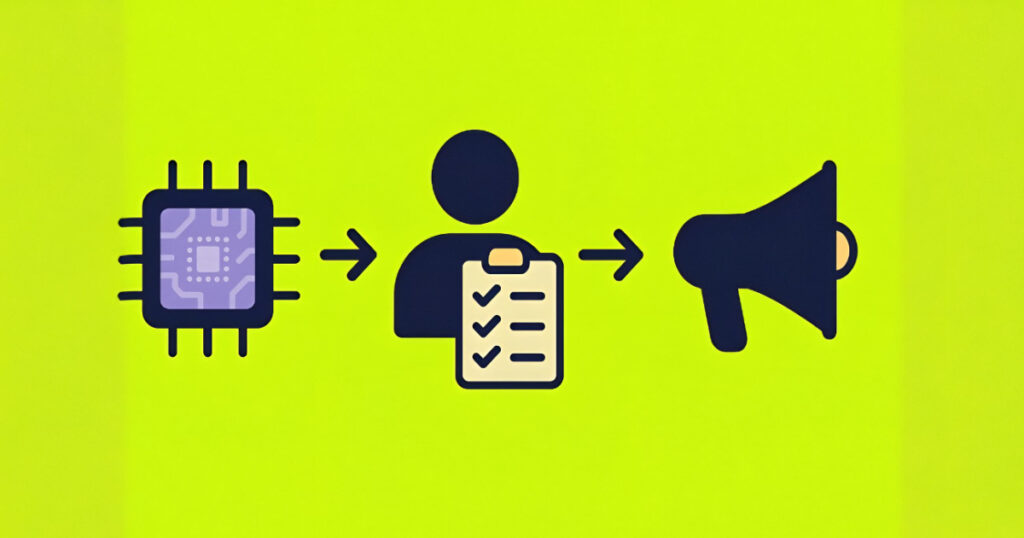
Define Human-in-the-Loop Workflows
Machines spot patterns fast, but judgment stays human. Embed checkpoints where analysts review ethical AI marketing output before publication. 94% of CEOs say AI adoption demands new employee skills and training.
Pause if answers to “What are the ethical considerations for using AI in marketing?” feel vague. Standardize sign‑off sheets reflecting AI ethics in digital marketing duties. Precise ownership data keeps AI marketing ethics off the wish list and onto calendars.
Schedule quarterly reviews to refresh AI ethics in marketing knowledge. Tie bonuses to respecting the ethics of AI in the marketing playbook.
Assign Clear Ownership
Roles prevent finger-pointing. This means you should name a product steward for every model. That steward investigates any ethical concerns of AI in marketing flagged by users.
Store actions in a ledger. 63% of consumers want to know when content is AI-generated. So, publish summaries to address the ethical implications of AI in marketing openly. This openness reflects ethical considerations and AI transparency and builds loyalty.
Promote Transparency in AI-Driven Campaigns
Clear disclosure boosts credibility; consumers expect AI‑generated content to be clearly labeled.
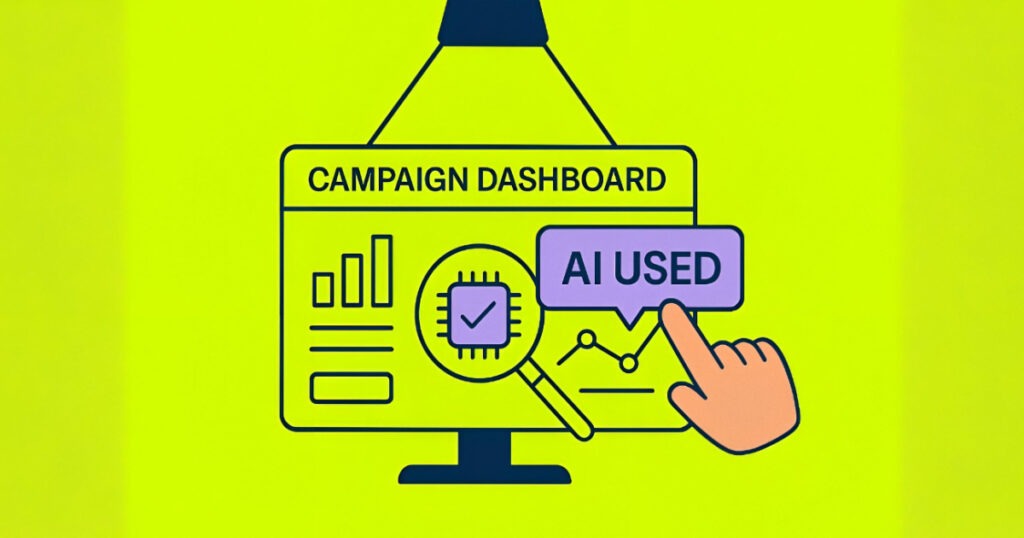
Disclose AI Use To Your Audience
Trust grows when you share your process, not hide it. 77% of professionals say AI boosts their confidence at work. So, mark assets with clear AI labels to elevate ethical AI marketing standards.
Repeat ethical AI marketing notes in footers, tooltips, and captions. Insert brief explanations, so clients understand why their data powers each channel. That effort cements AI marketing ethics as non-negotiable.
By stating AI ethics in marketing policies publicly, you reinforce the ethics of AI in the marketing story you tell.
Provide Explainability
Show your work like a great math teacher. Explain model factors in plain English or visuals.
Such openness tackles the ethical implications of AI in marketing head-on. It also meets ethical considerations and AI transparency benchmarks regulators expect. When your dashboard answers customer questions before they ask, you stick the landing.
Integrate Ethical AI Into Your Creative Process
Vigilant fact-checking matters because legal models hallucinate in one of six responses, exposing marketers to costly missteps.

Collaborative Ideation Sessions
Bring humans and models into the same workshop. Kick off with a reminder that ethical AI marketing guides every brainstorm. Repeat ethical AI marketing commitments on whiteboards, so creativity never forgets guardrails.
Ask each participant about the ethical considerations for using AI in marketing before accepting an idea. Blend insights from AI ethics in digital marketing with gut instinct to stress-test angles.
Capture improvements that advance the ethics of AI in marketing without killing speed. Note any AI ethical considerations or social media marketing risks when memes or reels surface.
Guard Against Hallucinations
Large models fabricate facts without warning. Legal experts warn that AI-powered outreach risks heavy fines under evolving consumer protection laws.
Design editorial reviews rooted in AI ethics in marketing best practice checklists. Flag suspicious claims and cross‑check sources.
Escalate unresolved ethical concerns of AI in marketing to your governance council. Address resulting ethical implications of AI in marketing in post‑mortems, not private chats. Finally, document fixes should be made to honor the ethical considerations of AI transparency for future teams.
Measure And Report On Ethical KPIs
Tracking transparency, bias, and environmental impact reveals progress and informs iterative fixes across campaigns.
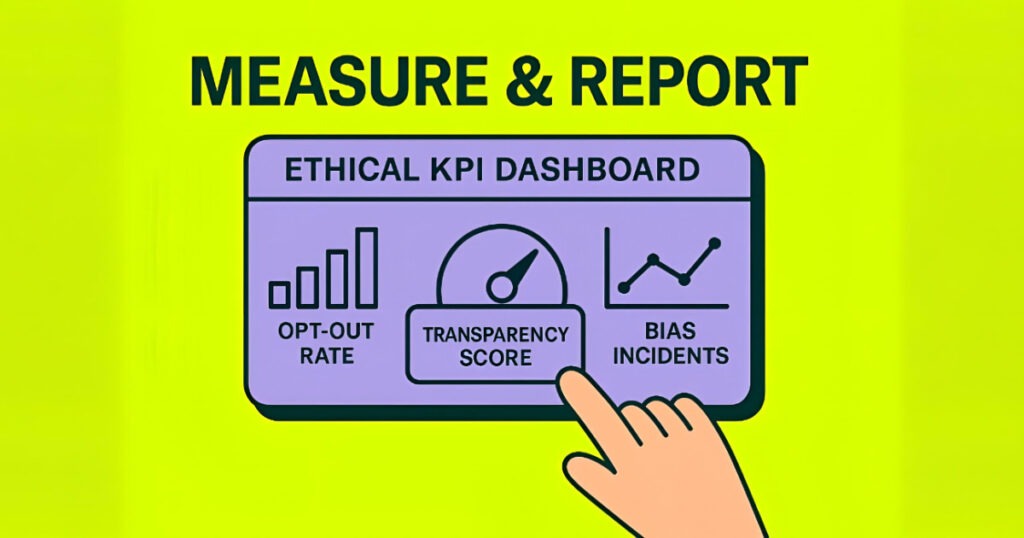
Define Ethical Metrics
What gets measured gets managed. Choose metrics that reflect ethical AI marketing progress, not vanity. Track bias incidents, opt-out rates, and disclosure compliance.
Log emerging ethical risks with severity levels and attach numbers to each risk for clear board updates. Then, highlight the improvement of transparency scores for each quarter.
Regular Reporting Cadence
Share findings widely. Publish snapshots in monthly newsletters, so teams act fast and use color-coded dashboards for clarity. This rhythm proves that ethics is performance, not paperwork.
Foster A Culture Of Continuous Learning
Continual skills programs keep teams current, turning curiosity into mastery as they effectively navigate rapid AI marketing evolution.
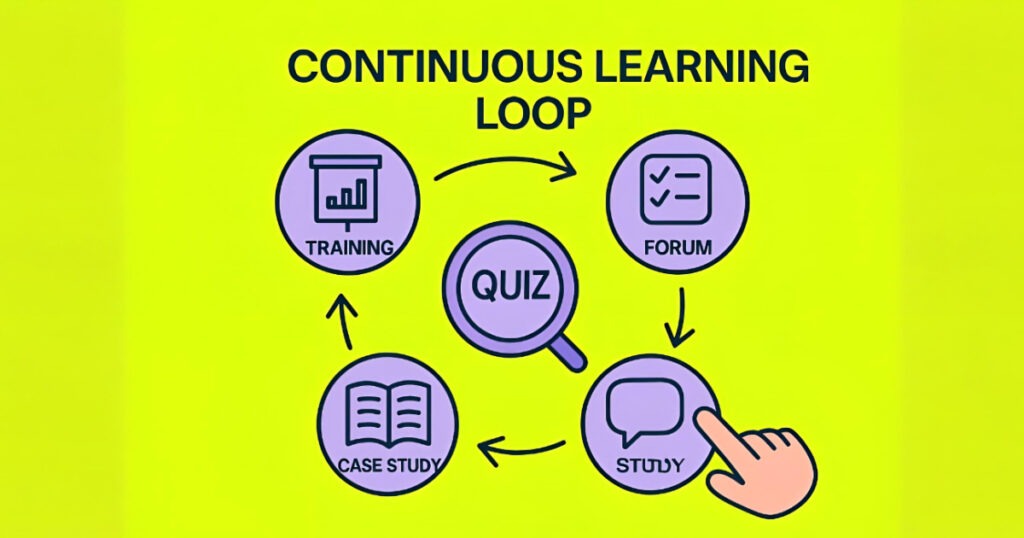
Ongoing Training Programs
Skills decay faster than software. So, run quarterly boot camps to refresh ethical AI marketing literacy. Include modules on ethical AI considerations in social media marketing because platforms evolve daily.
Encourage debate around emerging challenges so real stories guide policy. Present case studies on the ethical implications of AI in marketing to spark reflection. Close each session with a quiz covering transparency principles.
Community Engagement
Learning grows outward. Therefore, share lessons at industry forums, meetups, and podcasts. Congratulate teams who teach peers. That spirit turns ethics from compliance into movement.
FAQs: 8 Essential Steps to Empower You in Ethical AI Marketing
Get answers to common questions on ethical AI marketing practices, transparency, bias mitigation, and practical tools.
What Are The Ethical Considerations For Using AI In Marketing?
You must protect customer privacy by limiting data collection to what’s necessary and secure storage at every stage. You should audit algorithms for bias and fairness before they inform any targeting or creative decisions. You need transparent consent mechanisms, so every user understands how their data fuels AI‑powered experiences.
How Do I Ensure AI Transparency in Social Media Campaigns?
Always label content clearly when AI tools generate or personalize posts, ads, or recommendations. You can publish brief explainers or tooltips that outline how AI influenced each campaign element. Regularly share high‑level summaries of your AI models’ decision factors to build audience trust.
Which Framework Guides AI Ethics in Digital Marketing?
I rely on established standards like IEEE and ISO ethics principles adapted for marketing use cases. You can integrate these guidelines into governance policies, training, and accountability processes. This structured approach ensures your AI ethics in digital marketing commitments stay consistent across teams.
How Do AI Marketing Ethics Differ From Traditional Marketing Ethics?
Traditional ethics focus on messaging truthfulness, consent, and brand safety in human‑driven campaigns. AI marketing ethics also demand scrutiny of model training data, algorithmic bias, and automated decisions. You must layer new checks and balances on top of classic principles to address real‑time, machine‑led processes.
What Tools Can Help Audit AI Bias and Fairness?
Use open‑source libraries like Fairlearn or commercial bias‑scanning platforms to detect output imbalance. Combine automated audits with human review to validate results and interpret nuanced edge cases. Regularly retrain models on diverse datasets and track fairness metrics in your ethical KPI dashboards.
Leading With Integrity In The Age Of AI
Marketing earns loyalty when technology serves people first. By putting transparent guardrails around every model, you accelerate growth and protect your brand. When bias checks, consent trails, and human judgment sit at the heart of every campaign, trust scales with your reach.
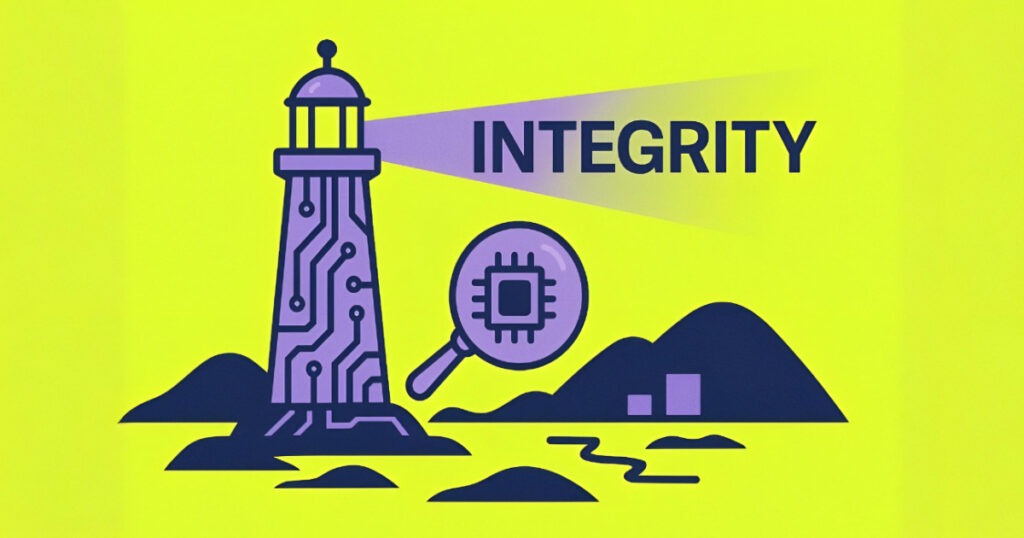
That trust invites stronger partnerships, bolder creativity, and measurable impact. My challenge is simple: audit your stack, refine your playbooks, train your teams, and share your learnings. Let these actions prove that innovation and ethics are co‑pilots, not rivals.
If you’re ready to turn principles into competitive advantage, let’s talk. Reach out and ask how I can help you build smarter, braver, and truly human marketing. Email me today and schedule a discovery call now.
